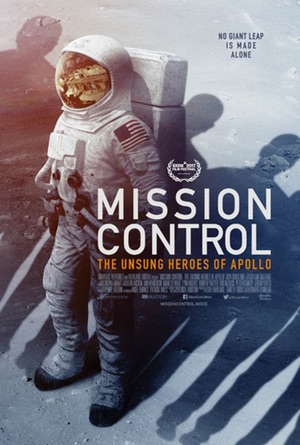Review: Mission Controlby Jeff Foust
|
| Keith Haviland, one of the film’s producers, recalled that, when preparing to interview Chris Kraft, “we were told to expect short answers” from the now 93-year-old. They asked Kraft their first question, about the development of Mission Control, “and we got a perfect 26-minute answer.” |
Indeed, in the early part of the new documentary Mission Control, a couple of present-day flight directors at the Johnson Space Center recall being asked to describe their jobs and referring to the portrayals of their predecessors in that movie. Now, though, they can turn to this documentary, where former flight controllers and directors describe working in the early years of Mission Control during some of the most historic missions of the early Space Age.
The documentary, based on Rick Houston’s book about Mission Control (see “Review: Go Flight!”, The Space Review, January 4, 2016), is centered on interviews with a number of those who worked there, particularly during the Apollo program. (Houston is an associate producer for this movie.) While there’s some discussion about the origins of the control center at what is now JSC, and its work on the Gemini program, the focus for much of the film is on three historic missions: the Apollo 8 mission to lunar orbit, the Apollo 11 lunar landings, and the rescue of Apollo 13.
The filmmakers interviewed many people who worked in Mission Control, such flight directors like Chris Kraft and Gene Kranz as well as those who worked various consoles, including Steve Bales, who gave the go-ahead to continue with the Apollo 11 landing after the computer alarms triggered during the descent—a decision, he recounts in the film, based on an simulation where he called an abort when a similar alarm was triggered.
During a screening of Mission Control last October at the Explorers Club in New York, filmmakers said they got great cooperation from the former flight controllers interviewed in the movie. Keith Haviland, one of the film’s producers, recalled that, when preparing to interview Kraft, “we were told to expect short answers” from the now 93-year-old. They asked Kraft their first question, about the development of Mission Control, “and we got a perfect 26-minute answer.” That complete answer, of course, doesn’t make into this movie, “but at some point we could turn it into a little film in and of itself.”
The film is a collection of those interviews as well as archival footage. It’s enhanced by some well-done computer-generated animations of some of the spaceflight events discussed in the movie, from the Apollo 11 landing on the lunar surface to the explosion that crippled Apollo 13, as well as a fine original score.
| One former controller interviewed said that, if he had it to do all over again, he wouldn’t take the job: it was that stressful and disruptive to his personal life. |
The film, which got its world premiere last month at the South by Southwest festival in Austin, Texas, is now in limited release, and is also available on video-on-demand (VOD) services such as Amazon Video and iTunes. The VOD option includes access to some additional features, including one where some of those involved with Apollo 13 discuss the effort to develop an adapter to allow the carbon dioxide scrubbers designed for use on the command module to work on the lunar module. That effort was dramatized in the movie Apollo 13 as well as news accounts of the missions, but the controllers played it down in that clip, saying they knew that effort was well in hand by engineers, and that one reporter who turned that effort into a life-or-death drama, Jules Bergman of ABC, became “persona non grata” among controllers afterwards.
The work of flight controllers on that mission was stressful: those interviewed recall spending several straight days at the center, without time to even shower or change clothes (the mission control room, as a result, was smelling “pretty ripe” as the flight dragged on, one recalled.) But the work, and the responsibility they had to those flying the missions, was stressful in any case. One former controller interviewed said that, if he had it to do all over again, he wouldn’t take the job: it was that stressful and disruptive to his personal life. This film, though, helps explain not only what flight controllers do, but will make you thankful for their service.
